Reflective Report on Management Theories in MGT600 Course
VerifiedAdded on 2022/08/16
|6
|1043
|13
Report
AI Summary
This reflective report examines the practical application of management theories within a corporate setting. It begins with an introduction to the challenges faced by companies and the role of management in addressing them, focusing on theories such as motivation, self-management, negotiation, communication, power dynamics, and conflict resolution. The report details the author's personal experiences during an internship, where they observed issues like high employee turnover and lack of motivation, and how these issues relate to Maslow's hierarchy of needs, the importance of job satisfaction, and conflict management strategies. The report highlights the significance of democratic and transformational leadership styles, organizational structure and various sources of power. The conclusion emphasizes the importance of applying leadership theories to enhance employee engagement and achieve organizational objectives.
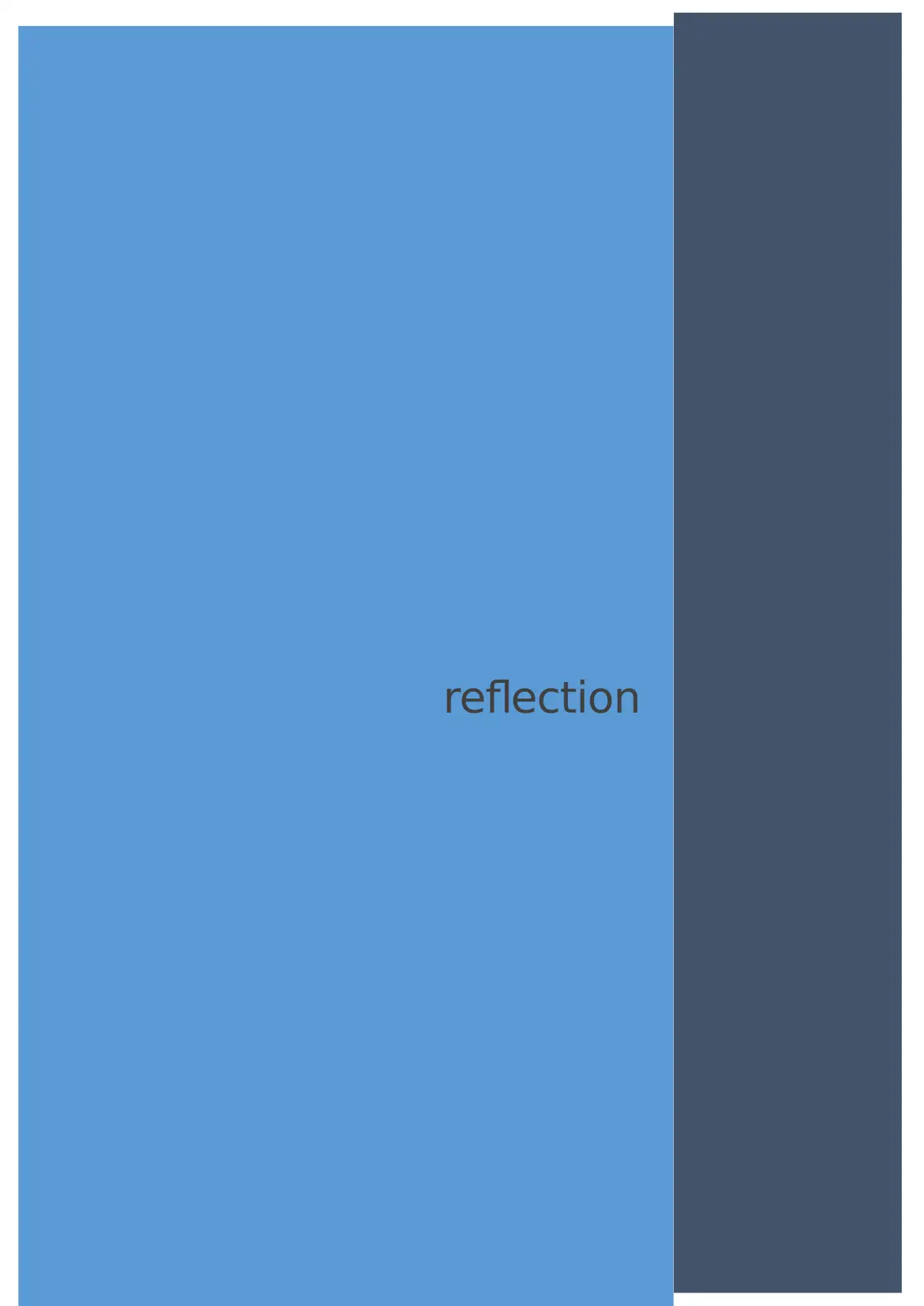
reflection
Paraphrase This Document
Need a fresh take? Get an instant paraphrase of this document with our AI Paraphraser
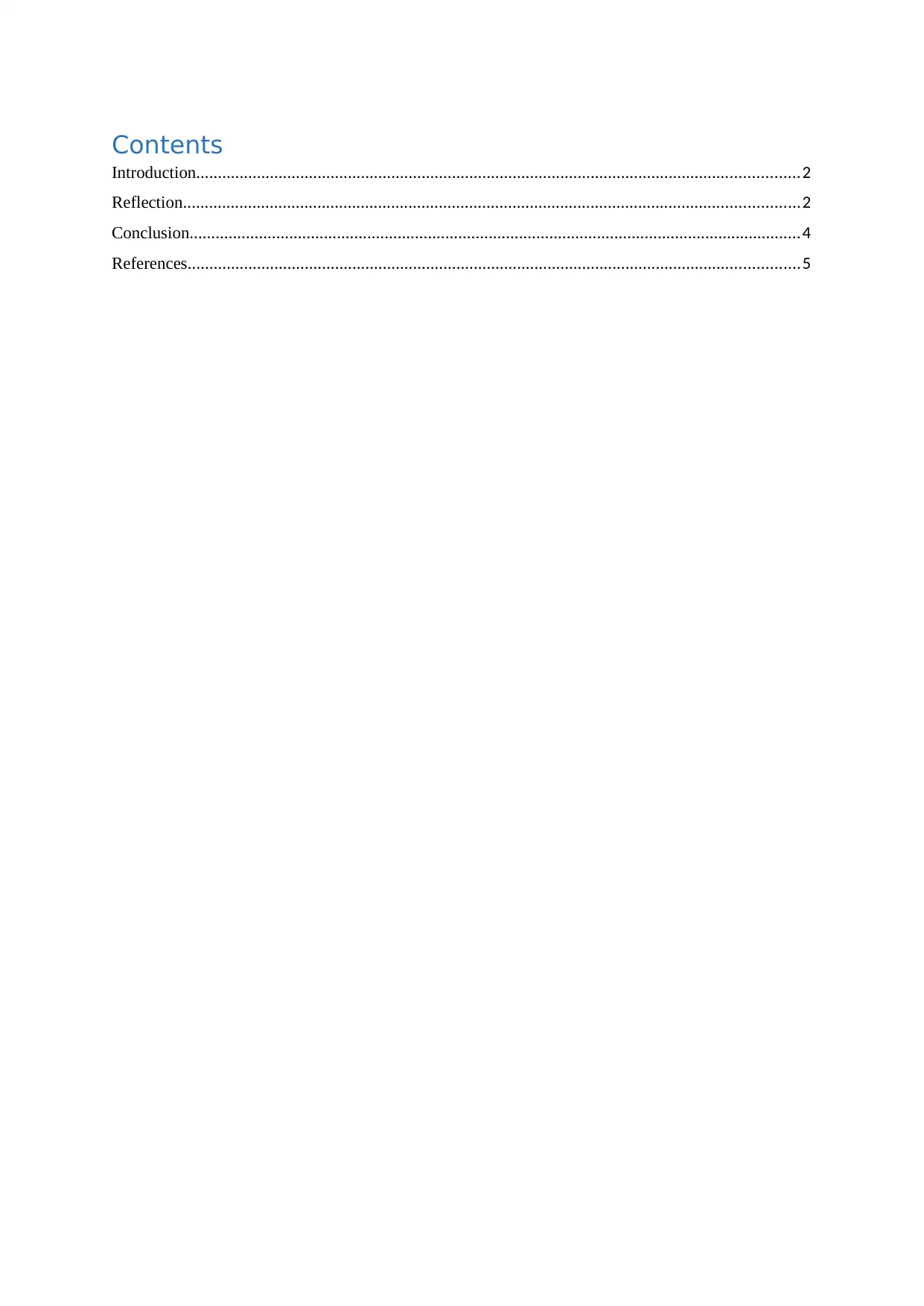
Contents
Introduction...........................................................................................................................................2
Reflection..............................................................................................................................................2
Conclusion.............................................................................................................................................4
References.............................................................................................................................................5
Introduction...........................................................................................................................................2
Reflection..............................................................................................................................................2
Conclusion.............................................................................................................................................4
References.............................................................................................................................................5
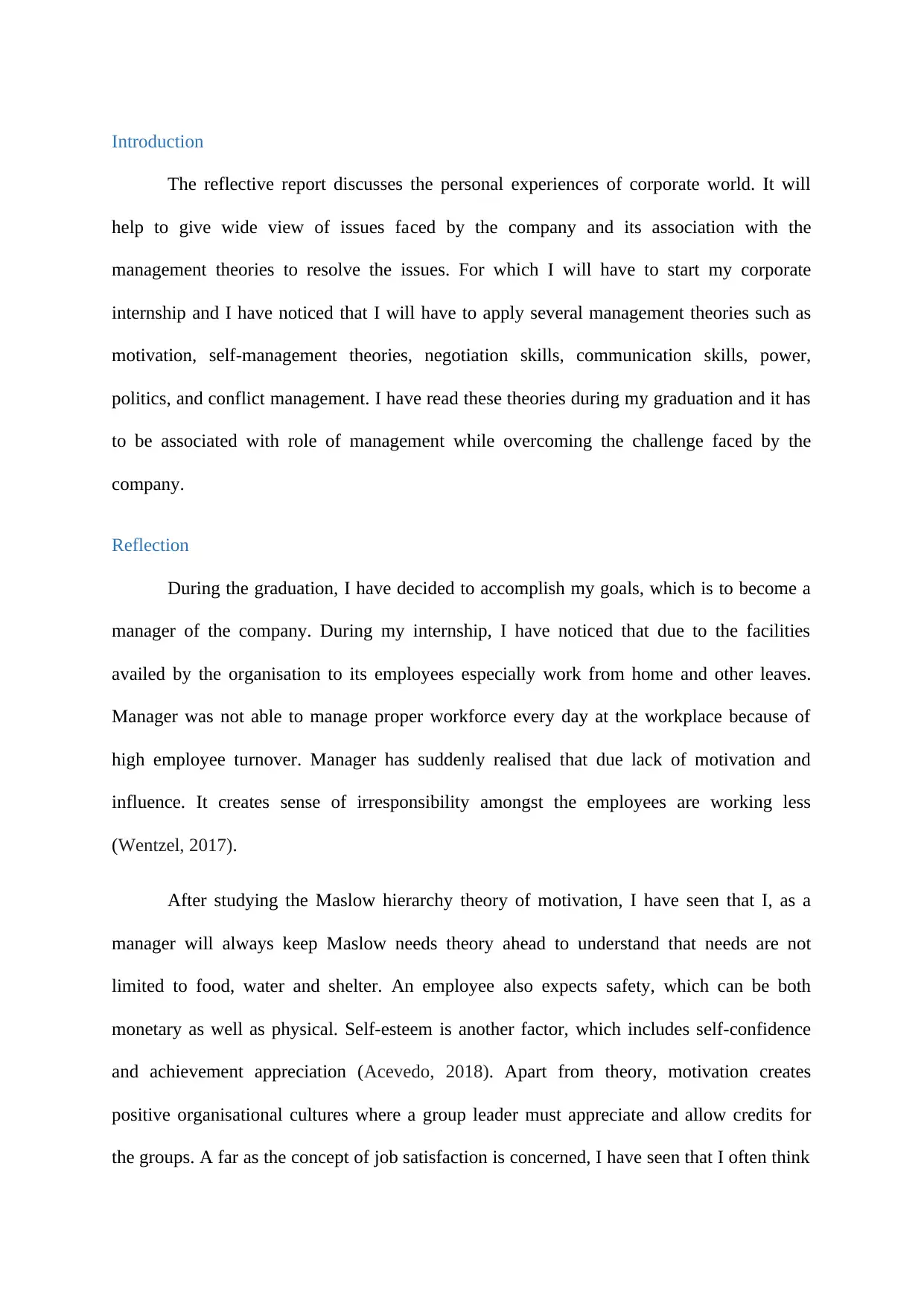
Introduction
The reflective report discusses the personal experiences of corporate world. It will
help to give wide view of issues faced by the company and its association with the
management theories to resolve the issues. For which I will have to start my corporate
internship and I have noticed that I will have to apply several management theories such as
motivation, self-management theories, negotiation skills, communication skills, power,
politics, and conflict management. I have read these theories during my graduation and it has
to be associated with role of management while overcoming the challenge faced by the
company.
Reflection
During the graduation, I have decided to accomplish my goals, which is to become a
manager of the company. During my internship, I have noticed that due to the facilities
availed by the organisation to its employees especially work from home and other leaves.
Manager was not able to manage proper workforce every day at the workplace because of
high employee turnover. Manager has suddenly realised that due lack of motivation and
influence. It creates sense of irresponsibility amongst the employees are working less
(Wentzel, 2017).
After studying the Maslow hierarchy theory of motivation, I have seen that I, as a
manager will always keep Maslow needs theory ahead to understand that needs are not
limited to food, water and shelter. An employee also expects safety, which can be both
monetary as well as physical. Self-esteem is another factor, which includes self-confidence
and achievement appreciation (Acevedo, 2018). Apart from theory, motivation creates
positive organisational cultures where a group leader must appreciate and allow credits for
the groups. A far as the concept of job satisfaction is concerned, I have seen that I often think
The reflective report discusses the personal experiences of corporate world. It will
help to give wide view of issues faced by the company and its association with the
management theories to resolve the issues. For which I will have to start my corporate
internship and I have noticed that I will have to apply several management theories such as
motivation, self-management theories, negotiation skills, communication skills, power,
politics, and conflict management. I have read these theories during my graduation and it has
to be associated with role of management while overcoming the challenge faced by the
company.
Reflection
During the graduation, I have decided to accomplish my goals, which is to become a
manager of the company. During my internship, I have noticed that due to the facilities
availed by the organisation to its employees especially work from home and other leaves.
Manager was not able to manage proper workforce every day at the workplace because of
high employee turnover. Manager has suddenly realised that due lack of motivation and
influence. It creates sense of irresponsibility amongst the employees are working less
(Wentzel, 2017).
After studying the Maslow hierarchy theory of motivation, I have seen that I, as a
manager will always keep Maslow needs theory ahead to understand that needs are not
limited to food, water and shelter. An employee also expects safety, which can be both
monetary as well as physical. Self-esteem is another factor, which includes self-confidence
and achievement appreciation (Acevedo, 2018). Apart from theory, motivation creates
positive organisational cultures where a group leader must appreciate and allow credits for
the groups. A far as the concept of job satisfaction is concerned, I have seen that I often think
⊘ This is a preview!⊘
Do you want full access?
Subscribe today to unlock all pages.

Trusted by 1+ million students worldwide
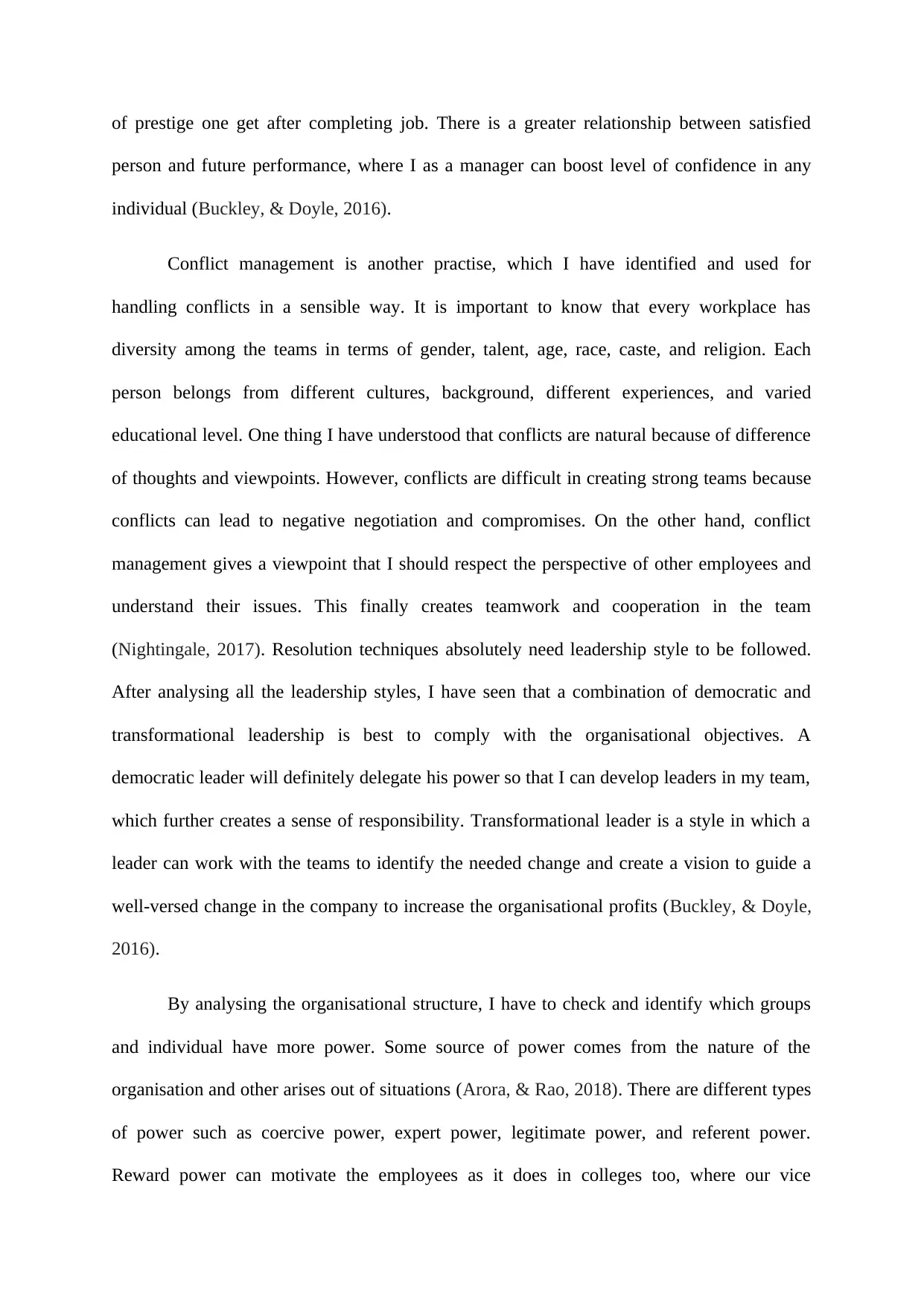
of prestige one get after completing job. There is a greater relationship between satisfied
person and future performance, where I as a manager can boost level of confidence in any
individual (Buckley, & Doyle, 2016).
Conflict management is another practise, which I have identified and used for
handling conflicts in a sensible way. It is important to know that every workplace has
diversity among the teams in terms of gender, talent, age, race, caste, and religion. Each
person belongs from different cultures, background, different experiences, and varied
educational level. One thing I have understood that conflicts are natural because of difference
of thoughts and viewpoints. However, conflicts are difficult in creating strong teams because
conflicts can lead to negative negotiation and compromises. On the other hand, conflict
management gives a viewpoint that I should respect the perspective of other employees and
understand their issues. This finally creates teamwork and cooperation in the team
(Nightingale, 2017). Resolution techniques absolutely need leadership style to be followed.
After analysing all the leadership styles, I have seen that a combination of democratic and
transformational leadership is best to comply with the organisational objectives. A
democratic leader will definitely delegate his power so that I can develop leaders in my team,
which further creates a sense of responsibility. Transformational leader is a style in which a
leader can work with the teams to identify the needed change and create a vision to guide a
well-versed change in the company to increase the organisational profits (Buckley, & Doyle,
2016).
By analysing the organisational structure, I have to check and identify which groups
and individual have more power. Some source of power comes from the nature of the
organisation and other arises out of situations (Arora, & Rao, 2018). There are different types
of power such as coercive power, expert power, legitimate power, and referent power.
Reward power can motivate the employees as it does in colleges too, where our vice
person and future performance, where I as a manager can boost level of confidence in any
individual (Buckley, & Doyle, 2016).
Conflict management is another practise, which I have identified and used for
handling conflicts in a sensible way. It is important to know that every workplace has
diversity among the teams in terms of gender, talent, age, race, caste, and religion. Each
person belongs from different cultures, background, different experiences, and varied
educational level. One thing I have understood that conflicts are natural because of difference
of thoughts and viewpoints. However, conflicts are difficult in creating strong teams because
conflicts can lead to negative negotiation and compromises. On the other hand, conflict
management gives a viewpoint that I should respect the perspective of other employees and
understand their issues. This finally creates teamwork and cooperation in the team
(Nightingale, 2017). Resolution techniques absolutely need leadership style to be followed.
After analysing all the leadership styles, I have seen that a combination of democratic and
transformational leadership is best to comply with the organisational objectives. A
democratic leader will definitely delegate his power so that I can develop leaders in my team,
which further creates a sense of responsibility. Transformational leader is a style in which a
leader can work with the teams to identify the needed change and create a vision to guide a
well-versed change in the company to increase the organisational profits (Buckley, & Doyle,
2016).
By analysing the organisational structure, I have to check and identify which groups
and individual have more power. Some source of power comes from the nature of the
organisation and other arises out of situations (Arora, & Rao, 2018). There are different types
of power such as coercive power, expert power, legitimate power, and referent power.
Reward power can motivate the employees as it does in colleges too, where our vice
Paraphrase This Document
Need a fresh take? Get an instant paraphrase of this document with our AI Paraphraser
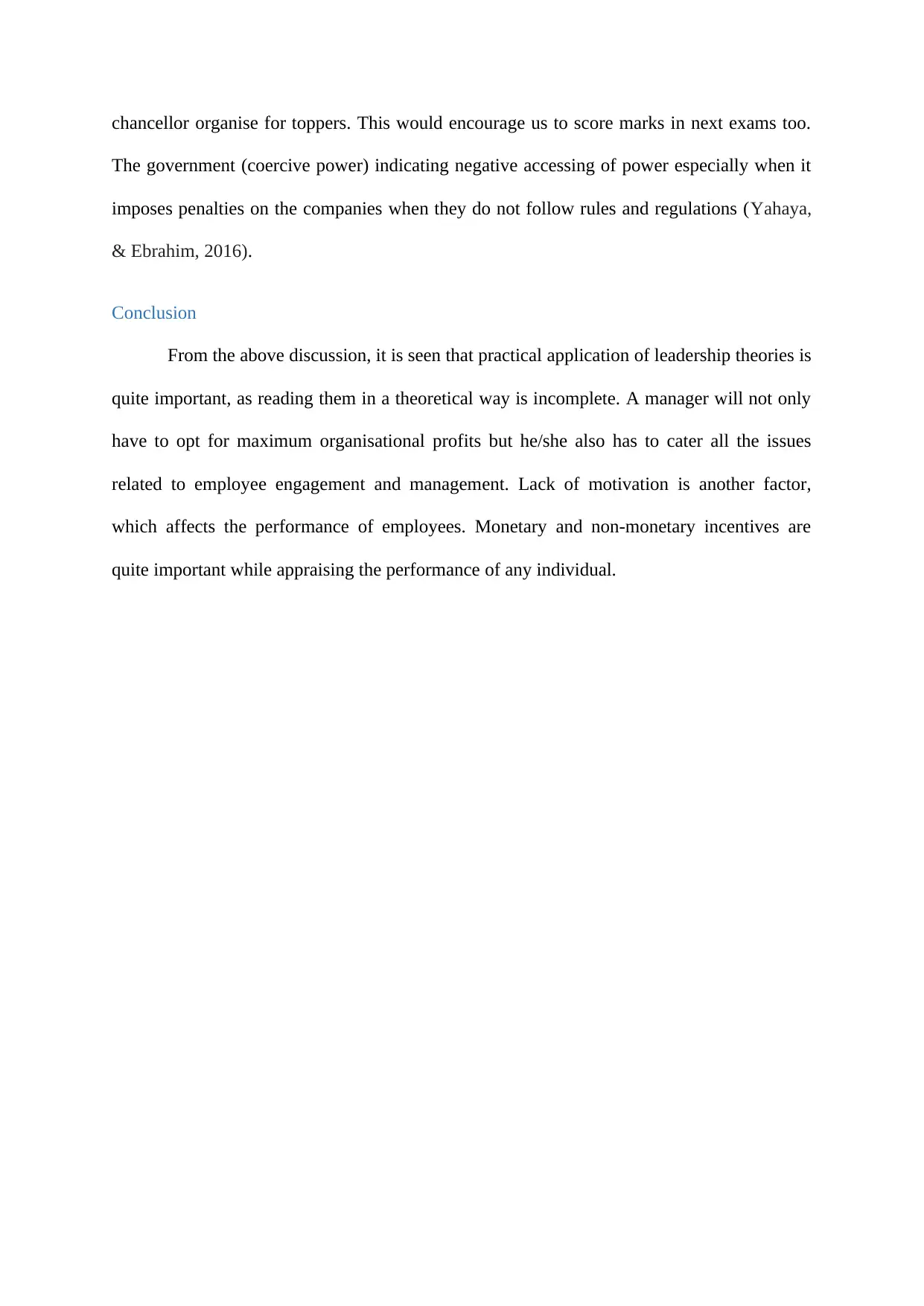
chancellor organise for toppers. This would encourage us to score marks in next exams too.
The government (coercive power) indicating negative accessing of power especially when it
imposes penalties on the companies when they do not follow rules and regulations (Yahaya,
& Ebrahim, 2016).
Conclusion
From the above discussion, it is seen that practical application of leadership theories is
quite important, as reading them in a theoretical way is incomplete. A manager will not only
have to opt for maximum organisational profits but he/she also has to cater all the issues
related to employee engagement and management. Lack of motivation is another factor,
which affects the performance of employees. Monetary and non-monetary incentives are
quite important while appraising the performance of any individual.
The government (coercive power) indicating negative accessing of power especially when it
imposes penalties on the companies when they do not follow rules and regulations (Yahaya,
& Ebrahim, 2016).
Conclusion
From the above discussion, it is seen that practical application of leadership theories is
quite important, as reading them in a theoretical way is incomplete. A manager will not only
have to opt for maximum organisational profits but he/she also has to cater all the issues
related to employee engagement and management. Lack of motivation is another factor,
which affects the performance of employees. Monetary and non-monetary incentives are
quite important while appraising the performance of any individual.
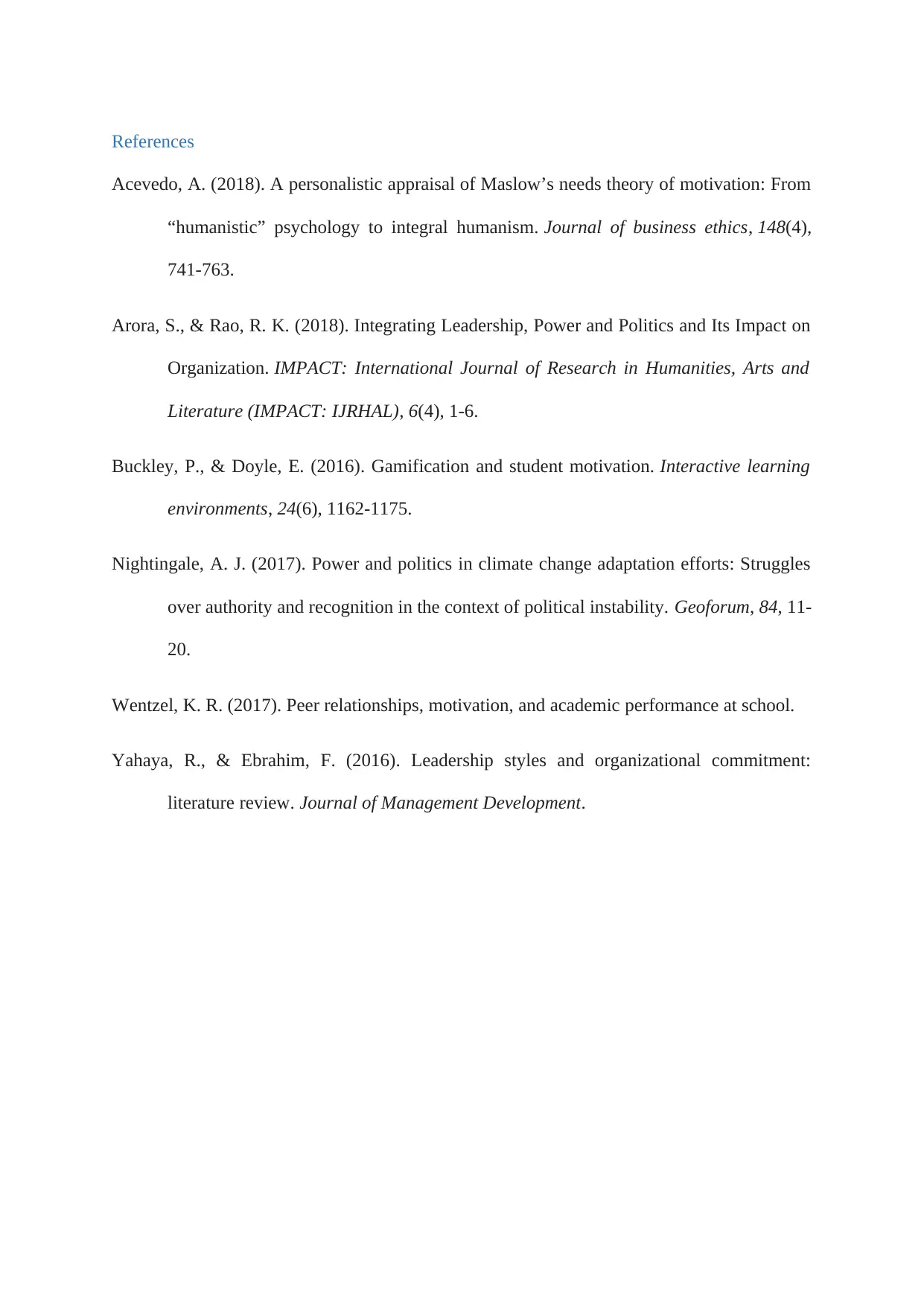
References
Acevedo, A. (2018). A personalistic appraisal of Maslow’s needs theory of motivation: From
“humanistic” psychology to integral humanism. Journal of business ethics, 148(4),
741-763.
Arora, S., & Rao, R. K. (2018). Integrating Leadership, Power and Politics and Its Impact on
Organization. IMPACT: International Journal of Research in Humanities, Arts and
Literature (IMPACT: IJRHAL), 6(4), 1-6.
Buckley, P., & Doyle, E. (2016). Gamification and student motivation. Interactive learning
environments, 24(6), 1162-1175.
Nightingale, A. J. (2017). Power and politics in climate change adaptation efforts: Struggles
over authority and recognition in the context of political instability. Geoforum, 84, 11-
20.
Wentzel, K. R. (2017). Peer relationships, motivation, and academic performance at school.
Yahaya, R., & Ebrahim, F. (2016). Leadership styles and organizational commitment:
literature review. Journal of Management Development.
Acevedo, A. (2018). A personalistic appraisal of Maslow’s needs theory of motivation: From
“humanistic” psychology to integral humanism. Journal of business ethics, 148(4),
741-763.
Arora, S., & Rao, R. K. (2018). Integrating Leadership, Power and Politics and Its Impact on
Organization. IMPACT: International Journal of Research in Humanities, Arts and
Literature (IMPACT: IJRHAL), 6(4), 1-6.
Buckley, P., & Doyle, E. (2016). Gamification and student motivation. Interactive learning
environments, 24(6), 1162-1175.
Nightingale, A. J. (2017). Power and politics in climate change adaptation efforts: Struggles
over authority and recognition in the context of political instability. Geoforum, 84, 11-
20.
Wentzel, K. R. (2017). Peer relationships, motivation, and academic performance at school.
Yahaya, R., & Ebrahim, F. (2016). Leadership styles and organizational commitment:
literature review. Journal of Management Development.
⊘ This is a preview!⊘
Do you want full access?
Subscribe today to unlock all pages.

Trusted by 1+ million students worldwide
1 out of 6
Related Documents
Your All-in-One AI-Powered Toolkit for Academic Success.
+13062052269
info@desklib.com
Available 24*7 on WhatsApp / Email
![[object Object]](/_next/static/media/star-bottom.7253800d.svg)
Unlock your academic potential
Copyright © 2020–2025 A2Z Services. All Rights Reserved. Developed and managed by ZUCOL.




